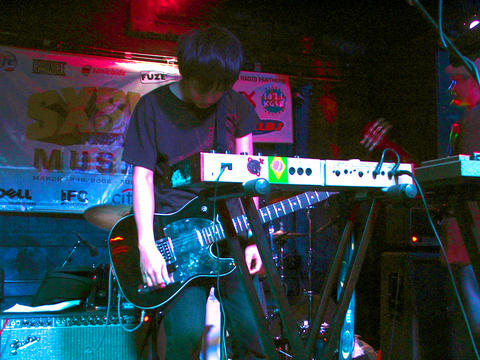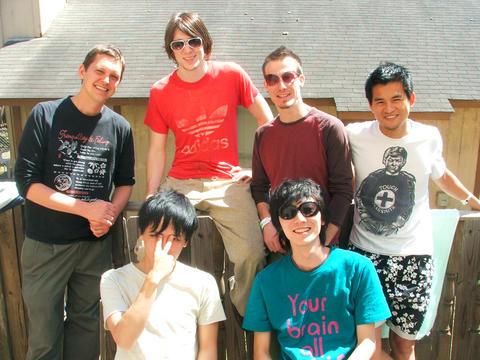When Cheer Hsieh (謝青翰) and Chet Liu (劉鎮) formed KbN (凱比鳥) in the late 1990s, they were just another group of guys with another punk band. Now, 10 years, several lineup changes and a major musical redirection later, the group made history when they played Saturday night at the Elysium club in Austin, Texas, becoming the first Taiwanese act ever to play South by Southwest .
"It was awesome to watch your own people playing on the stage so aggressively," said Ho Tai, a Taiwan-born US resident who drove down from Dallas and waved a Taiwanese flag on the packed dance floor during the band's performance. "I felt like I was one of them," he said. "I felt like I was playing on the stage."
Simply getting invited to SXSW, now regarded as the world's foremost rock festival, is a major honor for a young band like KbN. Only one-tenth of the 8,000 bands that applied were accepted to play at the five-day fest this year.

PHOTO: RON BROWNLOW, TAIPEI TIMES
But KbN's participation has added significance because the band is paving the way for other Taiwanese artists to play here in the future. A survey conducted by Austin Co-op Radio found the station's listeners want to hear more independent music from Asia. And SXSW organizers are keen on putting together a Taiwanese showcase next year.
"They're basically starting this connection that will turn into something that's much bigger than themselves," said Nathan Davis, a Taipei-based musician who plays with KbN and organized their trip to Austin. "It's much bigger than just one band coming to play a show at South by Southwest."
KbN was founded by Hsieh, now 25, and Liu, 26, when the two were classmates at the Affiliated Senior High School of National Taiwan Normal University (師大附中).

PHOTO: RON BROWNLOW, TAIPEI TIMES
After Bobo Chen (陳映霖) joined the group and dabbling in psychedelic folk, they became an experimental electronica group with the addition of Jerry Fang (方宜正), now 26, and his drum machine in 2000.
The band has survived the departure of several key members, including Liu, and has played at all of Taiwan's major rock festivals. Its music has appeared on compilation albums released by the Ho-Hai-Yan music festival and Taiwanese indie labels White Wabbit Records and Silent Agreement.
Two years ago, KbN's song Urge (衝動) earned a Golden Horse Award nomination for best original film song for the Hou Hsiao-hsien (侯孝賢) film Three Times (最好的時光).
But their visit to SXSW was only their second trip abroad and their first to a major festival. They played at Elysium on Saturday as part of Japan night, a popular SXSW fixture that tours the US after the festival ends.
"We are going to try to make some connections to bring some other bands from Taiwan next year," Hsieh said on the sidelines of a rehearsal on Wednesday. "I think a lot of Taiwanese bands are way better than us, but we were just lucky to get the chance to come here."
KbN was one of five Taiwanese bands scheduled to play at SXSW this year as part of a planned Taiwanese showcase. The other four bands backed out when it became clear they would not receive financial backing from the government or local cultural organizations. KbN organized several benefit concerts to pay for their expenses and received discounted tickets from United Airlines.
Chen and Hsieh traveled to the US with Davis - Fang's US visa application was rejected - and played shows in San Antonio and at an unofficial South by Southwest showcase, where they were filmed by a local TV station whose reporter introduced them on camera as "the first Taiwanese group to be and perform at South by Southwest."
Taiwanese musician Remi Huang (黃宏駿), 29, who traveled with KbN as a soundman, said the group was ideal for the role.
"Most of the bands in Taiwan really want to say something, but most of the time the things they want to say aren't very interesting. Or they care too much about a particular style of music" he said. "KbN focuses on their music. And they look good, too."
That was certainly the case on Saturday night, when Chen and Hsieh looked comfortable on stage as they layered synthesizer noise and an electric guitar through a keyboard over spare drum 'n' bass-influenced beats. The result sounded unique and avant-garde, but had enough hooks to keep the audience bopping and swaying. At the end of their set, they were joined by Davis on drums, bass player Joe Moody, keyboardist Jimmy Brettell and guitarist Brandon Cobb, for a fuller, funkier sound.
"They didn't seem typical - that's the best way of putting it," said Lee Fraser, who was at the Elysium on Saturday and heard KbN's performance.
Sitting on the club's terrace after the show, as fans approached him to compliment him on his performance, Chen said he was surprised by the enthusiasm and large size of the audience.
Hsieh said he will encourage other underground Taiwanese bands to do their best to participate in SXSW next year.
"We should all come together," he said. "If we have a Taiwan night it would be really fun."
For your information:
To listen to KbN's music and find out more about the band, visit www.myspace.com/funkbnice or funkbnice.podomatic.com.

April 28 to May 4 During the Japanese colonial era, a city’s “first” high school typically served Japanese students, while Taiwanese attended the “second” high school. Only in Taichung was this reversed. That’s because when Taichung First High School opened its doors on May 1, 1915 to serve Taiwanese students who were previously barred from secondary education, it was the only high school in town. Former principal Hideo Azukisawa threatened to quit when the government in 1922 attempted to transfer the “first” designation to a new local high school for Japanese students, leading to this unusual situation. Prior to the Taichung First

The Ministry of Education last month proposed a nationwide ban on mobile devices in schools, aiming to curb concerns over student phone addiction. Under the revised regulation, which will take effect in August, teachers and schools will be required to collect mobile devices — including phones, laptops and wearables devices — for safekeeping during school hours, unless they are being used for educational purposes. For Chang Fong-ching (張鳳琴), the ban will have a positive impact. “It’s a good move,” says the professor in the department of

On April 17, Chinese Nationalist Party (KMT) Chairman Eric Chu (朱立倫) launched a bold campaign to revive and revitalize the KMT base by calling for an impromptu rally at the Taipei prosecutor’s offices to protest recent arrests of KMT recall campaigners over allegations of forgery and fraud involving signatures of dead voters. The protest had no time to apply for permits and was illegal, but that played into the sense of opposition grievance at alleged weaponization of the judiciary by the Democratic Progressive Party (DPP) to “annihilate” the opposition parties. Blamed for faltering recall campaigns and faced with a KMT chair

Article 2 of the Additional Articles of the Constitution of the Republic of China (中華民國憲法增修條文) stipulates that upon a vote of no confidence in the premier, the president can dissolve the legislature within 10 days. If the legislature is dissolved, a new legislative election must be held within 60 days, and the legislators’ terms will then be reckoned from that election. Two weeks ago Taipei Mayor Chiang Wan-an (蔣萬安) of the Chinese Nationalist Party (KMT) proposed that the legislature hold a vote of no confidence in the premier and dare the president to dissolve the legislature. The legislature is currently controlled